Love the Best Picture nominees? Here are the best movies to pair with each 2024 Oscar hopeful
- Oops!Something went wrong.Please try again later.
- Oops!Something went wrong.Please try again later.
- Oops!Something went wrong.Please try again later.
- Oops!Something went wrong.Please try again later.
- Oops!Something went wrong.Please try again later.
- Oops!Something went wrong.Please try again later.
- Oops!Something went wrong.Please try again later.
"Barbie" and... "Working Girl?" We have some ideas about the best double features to craft with each Best Picture nominee.
Awards season is once again drawing to a close with Hollywood's Biggest Night, aka the Oscars.
True awards junkies have probably made sure to see every nominee, but even if you're not that intense about it, odds are you've caught one or two of the Best Picture nominees at least (especially considering that true box office hits like Oppenheimer and Barbie are in the mix this year).
Whether you were obsessed with Past Lives' subtle heartbreak or couldn't stop laughing at the comedic genius of the core cast of The Holdovers, odds are you have a favorite or two by now. If you've exhausted all of the awards bait, we have some ideas about what to watch next to craft the perfect double feature.
Here are 10 classic film pairings — match your favorite nominee with a throwback to create a winning double feature. Or why not envelop(e) yourself in them all? Surely, there's an award for that.

Everett Collection (3)
Margor Robbie in Barbie; Cillian Murphy in Oppenheimer; Lily Gladstone in Killers of the Flower MoonIf you liked Zone of Interest, watch Judgment at Nuremberg (1961)
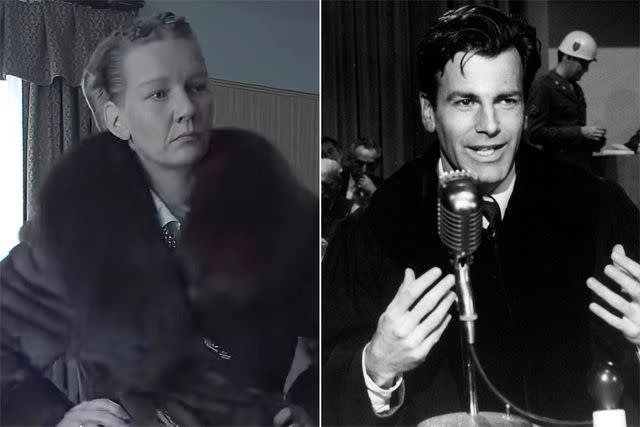
Everett Collection (2)
Sandra Huller in 'Zone of Interest;' Maximilian Schell in 'Judgment at Nuremburg'
While the concept of displaying the banality of evil is not new, Zone of Interest breaks new ground as a Holocaust film in its decision to put the horrors of the mass genocide just outside the frame, relayed only through some of the most terrifying sound design ever. With that in mind, it’s challenging to pair it with anything — but we’d suggest Judgment at Nuremberg, which similarly examines the complicity of everyday people who turned a blind eye to atrocities. When it premiered in 1961, Judgment was the first American feature film to show images of concentration camp survivors and victims. Zone utilizes a similar approach in its conclusion but to a different effect. Whereas Judgment uses primary sources to convey horror, Zone focuses on the museum at Auschwitz to further its message of mundane activity occurring on the fringes of humanity’s greatest crimes.
If you liked Poor Things, watch A Matter of Life and Death (1946)
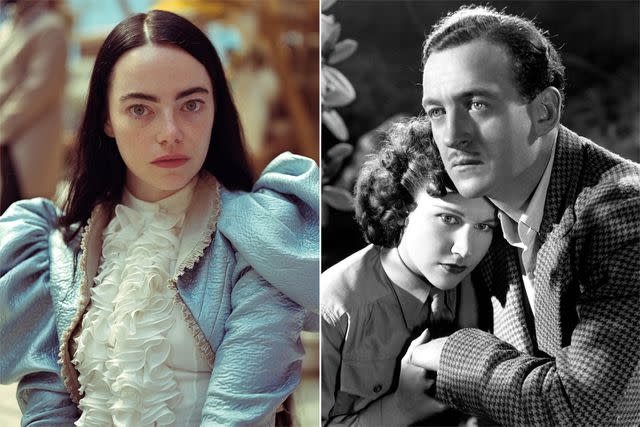
Everett Collection (2)
Emma Stone in 'Poor Things;' Kim Hunter and David Niven in 'A Matter of Life and Death'While Barbie director Greta Gerwig cited Michael Powell and Emeric Pressburger's A Matter of Life and Death as one of her myriad influences, we’d actually suggest pairing the film with Poor Things. The Technicolor lushness of Powell and Pressburger’s distinctive style is an ideal match for the cotton-candy steampunk fantasy of Yorgos Lanthimos’ film. Both Bella Baxter (Emma Stone) and David Niven’s Peter Carter cheat death, only to discover the fascinating possibilities of being alive. In a surrealist landscape with plenty of absurdist plotting, Bella and Peter are saved by love and self-determination in their own parables of discovery.
If you liked Barbie, watch Working Girl (1988)
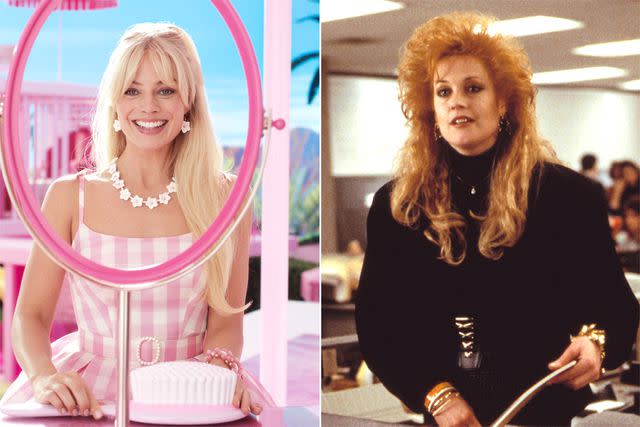
Everett Collection (2)
Margot Robbie in 'Barbie;' Melanie Griffith in 'Working Girl'
“I’ve got a head for business and a bod for sin” is basically the 1980s equivalent of America Ferrera’s feminist monologue in Barbie. The line, uttered by Melanie Griffith’s Tess, sums up the cognitive dissonance women face trying to make it in a man’s world. Barbie and Working Girl both tell the story of women plunged into a world far outside their own reality, only to bump their heads against the glass ceiling of the patriarchy. (Both also examine how the patriarchy can turn women — and men! — against each other.) While Barbie rocks every shade of pink, Tess McGill is the queen of the power suit — and together, they prove that a world that doesn’t make space for women and their ideas is lesser for it.
If you liked Past Lives, watch Brief Encounter (1945)
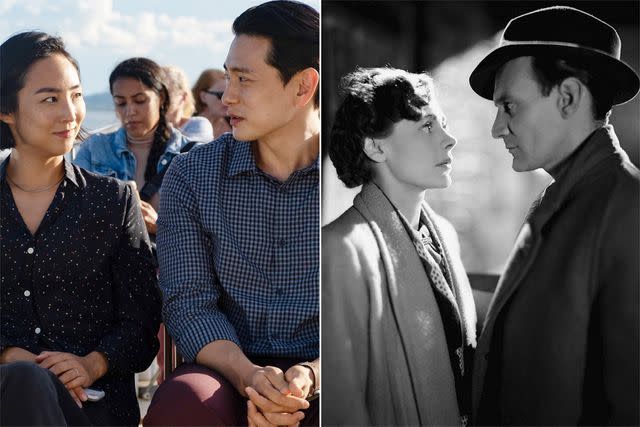
Everett Collection (2)
'Past Lives;' 'Brief Encounter'
What if? is a potent question, particularly as it pertains to love and loss. Both Past Lives and Brief Encounter interrogate questions of fate, love, and identity through the lens of a lost romance. Past Lives’ Nora (Greta Lee) reconnects with her childhood sweetheart, Hae Sung (Teo Yoo), and finds uncertainty creeping into her marriage. In Brief Encounter, Laura (Celia Johnson) also questions the monotony of her marriage when a chance encounter with Dr. Alec Harvey (Trevor Howard) on a train platform spurs the beginnings of an emotional affair. Both films deal with liminal spaces, as the couples connect in crowded railway stations, the Staten Island Ferry, and lunch halls. There, they meet the cacophony of modern life with heaps of old-fashioned yearning, clearly torn between the man they married and the promise of something different.
If you liked American Fiction, watch Bamboozled (2000)
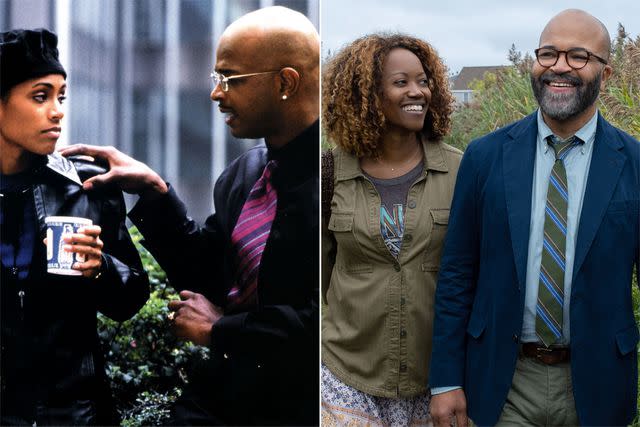
Everett Collection (2)
'Bamboozled;' 'American Fiction'
While American Fiction is an awards darling, Bamboozled played similarly with satire, race, and pop culture over 20 years ago and has only recently been reevaluated as a major work in Spike Lee’s oeuvre. What American Fiction does with literature, Bamboozled did with television. In American Fiction, Monk’s (Jeffrey Wright) novel is stuffed with every major Black literary stereotype he can imagine as a form of protest. But when the novel becomes an unexpected hit, he struggles to make peace with the turn of events. Bamboozled takes a more extreme approach, as highly-educated TV executive Pierre Delacroix (Damon Wayans) pitches a modern minstrel show in a bid to get fired. Instead, he unwittingly creates a smash hit as audiences respond gleefully to the show’s racist tropes. Both films satirize Americans’ limited view of Blackness, predominantly through stories of oppression and violence — and they offer no easy answers about the choice between fame, fortune, and doing the right thing.
If you liked, Oppenheimer, watch Dr. Strangelove or: How I Learned to Stop Worrying and Love the Bomb (1964)
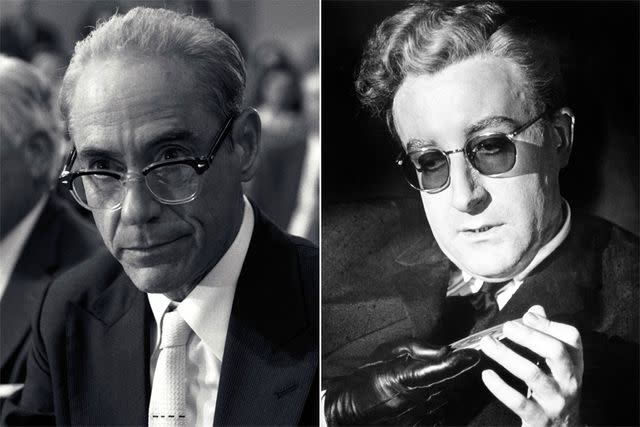
Everett Collection (2)
'Oppenheimer;' 'Dr. Strangelove'
A more exact one-to-one with Oppenheimer might be 1989’s Fat Man and Little Boy, which also tells the story of the Manhattan Project and J. Robert Oppenheimer. But Oppenheimer isn’t merely a historical drama nor a biopic; it’s something much more complex in the ways it plays with time, space, and guilt. While it chronicles the invention of the atomic bomb, it’s more interested in studying Oppenheimer’s psyche and the existential threat of the atomic age. Nothing has plumbed that subject more effectively (or with such dark humor) as director Stanley Kubrick’s own response to the bomb — Dr. Strangelove. With a hat trick of performances from Peter Sellers, the film satirizes the American military-industrial complex and Cold War paranoia while finding a few laughs in the face of nuclear holocaust. It might even cheer you up post-Oppenheimer viewing. Kinda.
If you liked The Holdovers, watch Goodbye, Mr. Chips (1939)
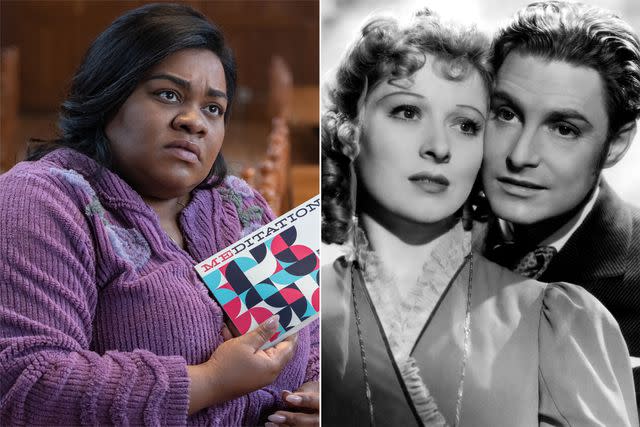
Everett Collection (2)
'The Holdovers;' 'Goodbye, Mr. Chips'
A crusty old professor finding unexpected understanding and friendship in a student is a tried and true narrative arc, and it’s put to touching use in The Holdovers. But Goodbye, Mr. Chips is where it all began. The film follows the life of Charles Edward Chipping (Robert Donat), an English schoolteacher who, over the course of 60 years, goes from a strict, disliked Latin teacher to a beloved fixture at the school. A lover of Latin puns (a trait shared with Paul Giamatti's Professor Hunham), Mr. Chips wins the love and affection of the boys at his school, even when younger headmasters try to push him out. It’s more sentimental and wide-reaching than The Holdovers, but the central story of a teacher-student bond that transforms lives remains the same.
If you liked Maestro, watch De-Lovely (2004)
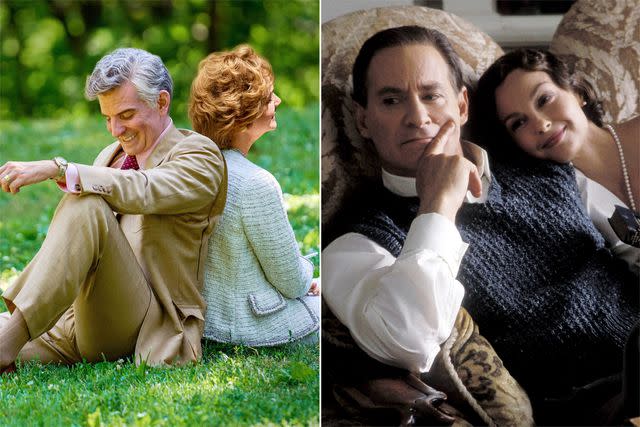
Everett Collection (2)
'Maestro;' 'De-Lovely'
Maestro is less an account of Leonard Bernstein’s life as a conductor and composer than a chronicle of his complicated marriage to Felicia Montealegre (Carey Mulligan). Felicia was well aware of Bernstein’s (Bradley Cooper) bisexuality and dalliances with men, and the film highlights the strain this placed on their marriage until Felicia’s illness brought them back together. It’s intriguing in how it mirrors the story of another great American composer, Cole Porter, whose life and marriage to Linda Lee Thomas was chronicled in 2004’s De-Lovely (and also in 1946’s Night and Day, a biopic with nearly zero basis in reality). Porter, as played by Kevin Kline, reflects on his life, particularly his marriage to Linda (Ashley Judd), which sustained him emotionally and creatively despite his frequent affairs with men. Both Maestro and De-Lovely are music-driven odes to great American composers, but more pointedly, they are testaments to the women who loved them and the trials those women endured.
If you liked Anatomy of a Fall, watch Anatomy of a Murder (1959)
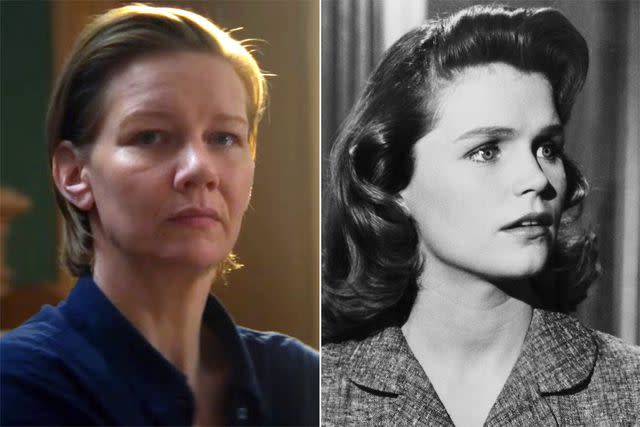
Everett Collection (2)
'Anatomy of a Fall;' 'Anatomy of a Murder'
Justine Triet’s twisty courtroom drama borrows its title from this 1959 Otto Preminger classic. Both are superb looks at the justice system, as well as issues of jurisprudence, witness credibility, and how misogyny and bias can shape the outcome of a case. In Anatomy of a Murder, there’s no question that Frederick “Manny” Manion (Ben Gazzara) murdered a local innkeeper. The issue at heart is whether Manny will get off with his attorney’s defense of “irresistible impulse,” a version of the temporary insanity plea. Jimmy Stewart’s Paul Biegler twists the jury and witnesses around his unassuming finger as he fights for his client, only for Biegler to be disillusioned by the result. Similar to Anatomy of a Fall, the courtroom arguments hinge on questions of sexual activity and infidelity, linking the potential murder to a troubled marriage. But Triet elevates it further in Fall, making even Sandra’s innocence an open question and transforming the drama into a piercing examination of the very nature of truth.
If you liked Killers of the Flower Moon, watch The Heiress (1949)
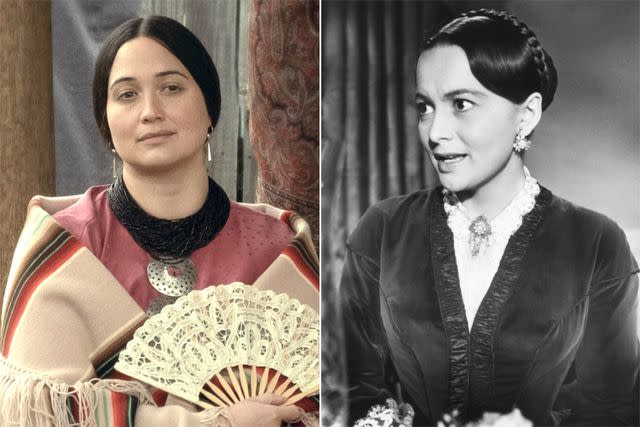
Everett Collection (2)
'Killers of the Flower Moon;' 'The Heiress'
Killers of the Flower Moon is a historical drama about the murders of the Osage people and subsequent investigations into their deaths. But it's also a tale of a lonely, naive young woman who falls for a greedy, confused young man — and the havoc that wrecks upon them both. Martin Scorsese has pointed to The Heiress as a major inspiration for the film and Lily Gladstone’s portrayal of Molly Burkhart in particular. On the surface, the atrocities against indigenous people at the heart of Flower Moon have very little to do with the 19th-century romantic disappointment of The Heiress. But both films trade on moments of casual cruelty, the ways that greed can twist love, and the masks humans often wear to manipulate those closest to them. Gladstone’s portrayal of Molly shares a great deal with De Havilland’s Catherine Sloper — women who have their hearts broken and the ways they can turn that cruelty back onto those who hurt them.
Want more movie news? Sign up for Entertainment Weekly's free newsletter to get the latest trailers, celebrity interviews, film reviews, and more.
Related content:
Read the original article on Entertainment Weekly.

